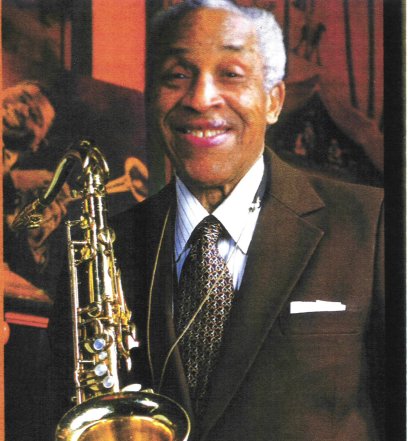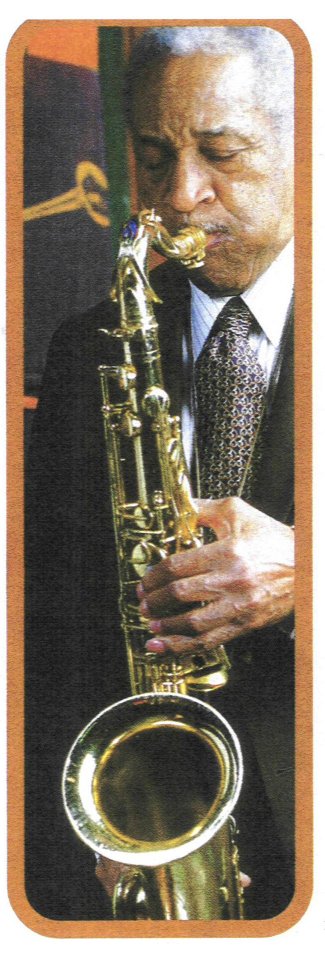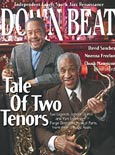

Earl Lavon "Von" Freeman
Jazz Tenor Saxophone


Legendary Jazz Saxophone Von Freeman
At the Palm Tavern in 2001

Johnny Griffin (left) and Von Freeman (right)
In the Palm Tavern for Down Beat magazine
March 2001
Von Freeman A Cause Without Glory
By John Corbett
Down Beat magazine, March 2001
Von Freeman (b. Oct 3, 1922) has a subconscious Chicago compass. In the front living room of the house that he’s called home for the past 51 years, on the city’s South Side, Freeman sits at the center of that flawless, navigational instrument. Referring to 23rd and Indiana, the location of the hospital in which he was born in 1922, he instinctively points forward, a little to his right, northeast. Discussing DuSable High School, where as a student he studied under the influential educator Captain Walter Dyett, he unthinkingly dips his head forward, north, toward the monolithic schoolhouse. Speaking about the New Apartment Lounge, where he’s been hosting a weekly jam session—the most important in Chicago for straight-ahead jazz players—for nearly 20 years, he automatically throws his thumb over his right shoulder, east-by-southeast.
Just being a lifelong Chicagoan is enough to install that innate map direction in anyone with the city’s grid, its insistent north/southness. But Freeman could be a compass for Chicago jazz history, too. He’s been active professionally for more than 60 years and seen almost all the changes in the city’s music first-hand, from the trenches.
A short biography of Von Freeman:
From: http://members.tripod.com/go54321/vf/vonfreeman.html
At age 16 Von played tenor in Horace Henderson's big band for a year. He was drafted into the Navy during WWII and after his return to Chicago he played with his brothers George on guitar and Bruz (Eldrige) on drums at the Pershing Hotel Ballroom. Various leading jazzmen such as Charlie Parker, Roy Eldridge and Dizzy Gillespie played there with the Freeman's as the backing band. In the early 50s Von played in Sun Ra's band. Von's first venture into the recording studio was for Andrew Hill's second single on the Ping label. He did some recording for Vee Jay with Jimmy Witherspoon and Al Smith in the late fifties and appeared and was recorded at a Charlie Parker tribute concert in 1970. It was not until 1972 that Von first recorded under his own name with the support of Roland Kirk. His next effort was a marathon session in 1975 released over 2 albums by Nessa. Since then his recordings have included 3 albums with his son, the tenorist Chico Freeman. Von is considered a founder of the Chicago school of jazz tenorists along with Gene Ammons, Johnny Griffin and Clifford Jordan.
Von's recorded output is not prolific for his years on the scene, in fact it has probably taken off most in the last ten years or so. His vinyl LPs can be hard to track down especially those that have not yet received CD release, but he still lives in Chicago and can be caught playing live there on a regular basis.
Von Freeman's 75th Birthday Tribute --Chicago -August 30, 1997 by Ken Waxman
"People ask me why I didn't leave Chicago?" queried tenor saxophonist Von Freeman, at centre stage on The Petrillo Bandshell for his 75th birthday tribute as the Saturday night finale of this year's Chicago Jazz Festival. "It's because I love Chicago and it loves me," he concluded. And then the gray-haired, loquacious, patriarch of the city's jazz musicians, proceeded to play a hearty chorus of "I Hear A Rhapsody," before introducing the other musicians on stage.
Indeed the love and respect Freeman takes as his due could be seen not only in the rapturous response to his appearance, which came from the thousands of fans gathered in Chicago's Grant Park for the 19th annual edition of the festival, but also from the musicians who participated in the tribute. Prominent among them at first was seasoned club vocalist Bettye Jean Reynolds, who has been part of the Freeman nightclub "show" for years and his brother, guitarist George Freeman, "who has been with me all his life," as Von declared. That crew, backed by Chicago piano legend John Young, sporting his trademark white cap; young bassist Rob Amster and veteran, but still many years Freeman's junior, drummer Mike Raynor performed their distinctive versions of a couple of jazz standards. Then it was star time.
Welcoming his son, New York-based tenor saxophonist Chico Freeman, Von allowed that he thought of all his musicians as if they were members of his family "like George Freeman ... Bettye Jean Freeman ... John Freeman ... Mike Freeman... Rob Freeman and ... Jack DeJohnette Freeman." Just then surprise guest drummer Jack DeJohnette, another former Chicagoan strolled on stage. With DeJohnette taking his place behind Raynor's drumkit, this new grouping went through a version of "Softly In A Morning Sunrise," with plenty of solo space for everyone.
Joined by diminutive trumpeter Brad Goode and with Young yielding his piano bench to AACM founder Jodie Christian, the group subsequently swung through "Speak Low". And that was a comment that could never be attributed to Von, who likes to keep a level of dialogue going at all times, no matter the topic.
After another tune that featured up-and-coming alto saxophonist Rudi Mahanthappa, who like Von helps organize jam sessions throughout the city, scat singer Kurt Elling, wandered on stage. Antimately waving his outstretched hands, he led the massed players through a ragged version of "Happy Birthday To You". Soon the crowd was on its feet demanding an encore as Von acknowledged the applause.
Calling for silence and joking that "the polices" would soon be called if the gathering didn't behave itself, Von graciously thanked everyone involved in his tribute, and retreated offstage playing an a cappella version of "Red Top", the old Gene Ammons hit from the 1940s.
Earlier dapper Von had confessed jocularly that "I was going to get a new suit and tie for the occasion. But then I figured doing what I did before this got me here in the first place, so why do it?"
He was right. The concert was a long overdue tribute to one of the world's many journeymen jazz musicians. These local legends are the ones who stick close to home, keeping the music alive and playing in as many situations as they can find. Freeman's distinctive, burry tone and open mind have over the years allowed him to work with stylists as disparate as Sun Ra and Horace Henderson and with innovators as notable as Charlie Parker and Muhal Richard Abahams.
Yet while the past couple of decades has finally seen his work committed to LP and CD in different settings, his ultimate legacy may be the jam sessions he led and continues to lead all over the city. Those sessions, which have been going on for more than 40 years and which have encouraged and inspired scores of young players, some of whom shared the stage with him that night, are as important as any universal fame or encyclopedia reference.